Texas A&M Philanthropy Course Gives $62,500 to Local Nonprofits

MBA students in the Strategic Philanthropy class at the Texas A&M University at Mays Business School put their money where their class is: this year, the program awarded $62,500 to nonprofits throughout the area.
Alumni Spotlight: Daryl Morey and Swapping Intuition for Analytics
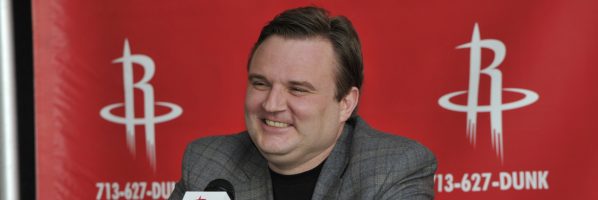
In 2006, when Houston Rockets owner Les Alexander announced that MIT Sloan School of Management MBA, analytics expert, and relative NBA unknown Daryl Morey would eventually serve as general manager of the team, the basketball community was surprised, to say the least. A Hoopsworld headline, at the time, read, “Daryl Morey? Are You Serious?”
Though using quantifiable data to make business and strategic decisions across the majority of professional sports has become the norm, in 2006, it was far from standard practice, especially in the world of basketball. At the time, Michael Lewis’s book, Moneyball, was just three years old, and it only highlighted the use of analytics in baseball; perhaps the most straightforward team sport to quantify.
Now, 11 years into his career as a general manager, Morey’s use of analytics to guide NBA decisions ranging from draft picks, to whether a player should go for a three-point shot or a mid-range jumper (hint: take the three point shot) has made him a sports statistics pioneer.
Early Life and Career
While growing up in Medina, Ohio, Morey developed a love of sports. But, according to a profile in Slate, after reading articles written by alleged authorities making predictions for sports teams’ successes that proved way off base, Morey began to question the effectiveness of these experts. Shortly after this realization, Morey happened upon a book by the original sports statistics advocate, Bill James, author of the seminal 1977 book The Bill James Baseball Abstract. James’s data-based philosophy immediately resonated with Morey as the way to mold winning sports teams.
Though he knew early on that he wanted to devote his life to sports, Morey was uncertain of how to gain access to the exclusive business side of the industry. During his time at Northwestern University, Morey sent scads of letters to pro teams, begging for a shot at even the most low-ranking jobs. Each of these letters went unanswered. “So I decided at that point that I had to be rich. If I was rich I could just buy a team and run it,” Morey said.
It was this line of thinking that led the young midwesterner to apply to MIT’s Sloan School of Management. After earning his MBA from MIT in 2000, Morey pursued a career in consulting. Eventually this led to a job working for the Boston Celtics. It was during this time that Morey began applying a statistical model he had developed to size up amateur players to the actual draft. Just a couple of years later, Morey was approached about a managing position for the Houston Rockets, where he has now served as general manager for eleven seasons and has just signed on for an additional four years.
Philosophy and Contributions
At just 21-years old, Morey adapted Bill James’s Pythagorean Expectation, a formula used to predict how many games a team would win, to basketball. “I would have never guessed that you could adapt the Pythagorean to basketball,” James said.
In basketball, Morey is partially credited with normalizing the use of analytics in player acquisitions, as well as approach to the actual game. Under his leadership, the Rockets acquired franchise cornerstone James Harden in what is, in hindsight, already considered one of the more lopsided trades in basketball history. Morey was also instrumental in starting the annual MIT Sloan Sports Analytics Conference, a forum wherein students and professionals can exchange views on the role of analytics in the sports industry.
When asked about his thought processes in Northwestern Magazine, Morey said, “You don’t fool yourself, you take a lot of chances, you cut your losses quickly. That’s all you can do.”
Like the slow-crawl of acceptance sabermetrics toiled through in Major League Baseball, Morey’s analytical imprint on the NBA has routinely drawn the ire of some of the game’s most notable figures, including Hall of Famer, “golfer,” and Inside The NBA host Charles Barkley. In 2015, Barkley routinely chided `the Rockets’ paltry defensive efforts, noting Morey’s tactics of bringing in players seemed fairly basic.
Just two years later, however, and the Rockets are currently riding a 10-game win streak and sit atop of the vaunted Western Conference, with Harden earning potential MVP praise and point guard Chris Paul commanding one of the league’s best offenses. And Morey’s analytical emphasis on three point shooting and pick and roll sets, dubbed “Moreyball,” has never been more prominent. The Rockets lead the league—by far—in three-point attempts per contest, launching a blistering 43.2 per game. For context, the team with the second most three-point attempts per game, the Brooklyn Nets, take 33.8 per game—nearly 22 percent less than Houston.
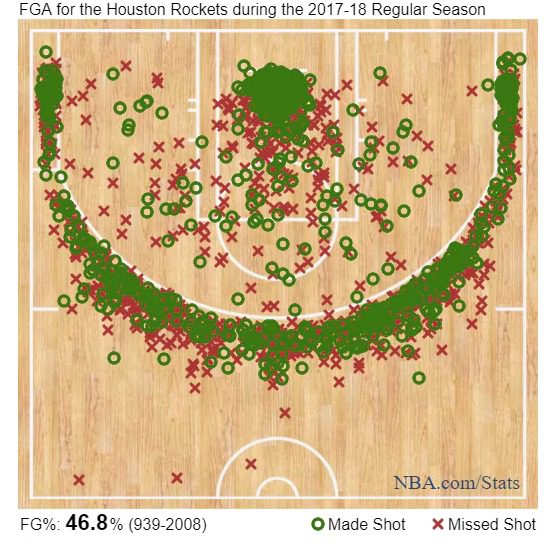
Stats via NBA.com/Washington Post
The Rockets’ analytical trend may seem extreme, but the rest of the league is still taking notice. The average three point attempts taken per game, nearly a quarter of the way into the 2017-18 season, is the highest ever at 28.7 attempts per game per team; and those figures have gone up every year since 2012. If Moreyball remains a staple of the NBA offense, expect that figure to be broken again in 2019.
Other Pursuits
Morey has a love of musicals, and even proposed to his now-wife Ellen before a production of Grease. It makes sense then that the man the New York Times called a “wizard in the field of quantitative analysis,” has chosen to devote his time to producing a musical. The show, “Small Ball,” is slated to debut in 2018.
Part-Time MBA Battle: Houston v. Dallas

Among the bustling metros of the Lone Star State, Dallas and Houston are the biggest. Locals from the Houston and Dallas metros are die-hard about their towns, and their business schools take their MBA programs seriously. Both cities offer plenty of part-time options to prospective MBAs, so let’s take a deeper dive.
Location
While Houston and Dallas are only about four hours away by car, each metro offers completely different living experiences. As far as weather goes, if you dislike humid climates, Dallas may be the location for you. If you love being by the water, Houston may be up your alley—though the city, unfortunately, is more at risk for tropical storms and hurricanes.
Houston is statistically the more expensive city to live in, but not by a significant margin. According to Numbeo, a database of user contributed data about cities, you would need around $4,242 in Houston to maintain the same standard of life that you can have with $4,000 in Dallas, assuming you do not own a home. As far as entertainment goes, it’s really a tie: Both metros boast great restaurants, shopping, sports entertainment, and nightlife.
Here are a couple more quick stats comparing Houston and Dallas, courtesy this awesome infographic from SpareFoot:
- Houston is the 5th best US city for good jobs, Dallas ranks 18th.
- Houston is the 5th best US city for job seekers, Dallas is 6th.
- Dallas has the 13th lowest unemployment rate in the US, Houston is 18th.
- Dallas has the 9th most affordable housing marketing in the US, Houston is 8th.
Not every MBA candidate can manage a full-time degree program. So many business school students continue to work throughout their studies, balancing a job and graduate school through a part-time MBA program. Many of these programs take place in the evenings and on weekends, allowing for flexibility along with continued professional growth.
Dallas Part-Time MBA Programs
The following schools in the Dallas metro offer part-time MBA programs:
- Cox School of Business – Southern Methodist University
- Naveen Jindal School of Management – University of Texas at Dallas
- Neeley School of Business – Texas Christian University
- University of North Texas College of Business
- University of Texas at Arlington College of Business
The Southern Methodist Professional MBA features a flexible and modular curriculum that students can customize to their learning and future career goals. Students have the option to choose a concentration and a minor from nine subject areas, including: accounting, finance, general business, information technology and operations management, management, marketing, real estate and strategy, and entrepreneurship.
The estimated total cost of the aforementioned Professional MBA program is $93,696. This figure excludes costs such as books, materials, housing, or transportation. However, approximately 60 percent of students receive some form of financial aid, either need-based or consumer loans.
The Professional MBA program at the Naveen Jindal School of Business consists of taking two classes each semester, and classes are usually offered Monday-Friday from 4 to 10 p.m. The program is offered three different formats: a Evening Cohort, Flex, and Online. The Evening cohort option can be completed in 24 months, and allows the entire intake to experience the 30 required classes together. The Flex program lets students finish their degree on their own schedule, online and on campus. Similarly, the Online MBA offers plenty of scheduling options, but a limited choice of electives and concentrations.
Tuition costs depend on the amount of courses taken per semester and which track students are enrolled in. At UT Dallas, students pay lower per credit when taking more classes per semester. The estimated cost for tuition and fees for in-state residents in the Evening PMBA program is $42,347, and $78,449 for non-residents and international students. Tuition and fees for resident students in the online program is estimated at $49,531, with non-resident tuition at $84,016. Scholarship opportunities are available.
The Professional MBA at the Neeley School of Business meets twice a week in the evenings. The cohort-based program that can be completed in as little as 24 months or as many as 33 months—the amount of time it takes to complete the program depends on how students schedule their elective courses.
One year of the Texas Christian Professional MBA program costs an estimated $33,090, which includes tuition and other program fees. Books and other course materials are estimated at about $1,000.
Students in the University of North Texas MBA program have the option of taking courses on a full-time or part-time basis, and can earn a MBA degree in such areas as finance, health services management, marketing, logistics and supply chain management, organizational behavior and human resource management, strategic management, or business studies. Students completing the MBA in business studies also have the opportunity to complete a concentration in international business, library science and technology, real estate, or sustainability.
The UT Arlington Professional Cohort MBA structure is created for experienced professionals who want to continue to work full-time and follows the same 45-credit hour curriculum as the MBA flexible structure. The cohort structure allows students to complete courses in accelerated five or eight-week sessions, which allows students to complete their MBA in 24 months. This format is only offered at the Fort Worth campus. The estimated cost of the MBA program at the University of Texas at Arlington College of Business is $25,382.
Houston Part-Time MBA Programs
The following schools in the Houston metro offer part-time MBA programs:
- C.T. Bauer College of Business – University of Houston
- Cameron School of Business – University of St. Thomas
- Jesse H. Jones School of Business – Texas Southern University
- Rice University – Jones Graduate School of Business
- University of Houston – Downtown
The University of Houston Professional MBA program is a flexible program that takes 22 months to complete and consists of 48 credit hours. Students must complete 21 core credit hours and 27 elective credit hours.
Tuition costs at Bauer are estimated at $42,000 for Texas residents, $66,600 for non-resident students, and $72,000 for international students. Costs can change depending on how many classes a student is taking and their student status MBA students can get financial assistance in the form of student loans and scholarships, such as the MBA Bauer Excellence Scholarship. Students can receive up to $10,000 per year, qualify for in-state tuition (for nonresidents) and receive a two-year subscription to The Wall Street Journal.
The Cameron School of Business offers a flexible MBA that holds classes on the weekends and in the evenings. Students in the MBA program at Cameron are required to complete 36 academic hours: 27 hours are in core course and nine credit hours are elective courses.
The cost of the Cameron School of Business MBA program is $1,163 per credit hour. Students taking eight or fewer credit hours per semester are required to pay a $47 activity fee. Those students taking nine or more hours are required to pay $82. Students must also pay a $100 new graduate student fee and an $80 technology fee. Students are required to pay all fees every fall and spring semester.
The Texas Southern MBA program at the Jesse H. Jones School of Business provides a general management education to students who are looking to advance their current careers in business management, and can be taken in a full-time or part-time schedule. Part-time program students can complete their MBA degree over a flexible amount of time, depending on their availability to complete courses. All students complete courses over the fall, spring, and summer semesters.
The Jones MBA costs about $7,130.38 a year for in-state residents and $13,700.38 a year for out-of-state folks. Other fees such as room and board, transportation, books and other personal expenses are not factored in the cost of the program.
Rice University’s MBA for Professionals is a flexible program that offers an evening or weekend option to allow students to maintain their current work schedules. The traditional professional MBA is held in a lock-step format while the Extended Professional MBA program holds classes two evenings a week during the first semester and one evening a week after that. Students in this program can extend their education for three years or more, up to five, in order to better fit with their schedule.
The current tuition cost is $101,500 for the Evening and Evening Extended programs and $105,500 for the Weekend program. The tuition covers the complete 22-month schedule of coursework and is billed in 25 percent increments over four semesters.
The University of Houston Downtown part-time MBA can be completed in two or three years. Classes are offered in a hybrid form, with some classes taking place on campus and others online. Students may elect to pursue a “soft start” to their MBA, where students pursue their concentration classes first, or a traditional-start MBA students, where they take core classes the first year, followed by concentration classes in the second year.
The school also offers a three-year path to an MBA where students work on their concentration the first year and then take the core classes in the second and third years, or elect to pursue a traditional start by taking core classes in the first two years and concentration courses in their third year.
At $532 per credit hour for in-state students, tuition for a UHD MBA varies depending on the concentration. Students concentrating on finance, human resource management, leadership management, or business development/sales management will pay $21,840. Concentrations in supply chain management, international business or accounting cost $23,940. An MBA with a general management concentration costs $18,088. Out-of-state students pay about $28,300 and out-of-country students pay around $28,480.
University of Houston SURE Program Profiled by Houston Chronicle
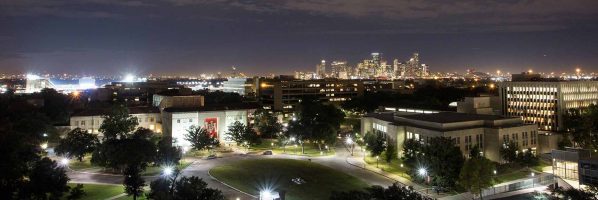
Lydia DePillis of the Houston Chronicle recently sat down with Dr. Saleha Khumawala, professor at the University of Houston C.T. Bauer College of Business, to discuss her work with the SURE program: Stimulating Urban Renewal through Entrepreneurship.
The Houston International MBA Programs You Need To Know
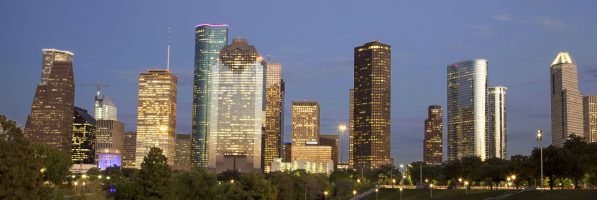
Pursuing higher education in Houston does not have to mean that students are tethered to one city—or even one country—the entire time they are in school.
Below, we’ve laid out the four best Houston international MBA programs.
C.T. Bauer College of Business – University of Houston
The University of Houston’s C.T. Bauer College of Business offers several options for aspiring MBAs who want to learn to navigate the global marketplace. All of Bauer’s Executive MBA students have the opportunity to do an International Business Residency (IBR) between their first and second years. Each class travels together to a country determined in advance by program coordinators. The IBR is seven days long, and students will use these days to meet with foreign political figures, experience the country’s culture, and tour global companies.
Bauer also offers a Global Leadership Executive MBA for students who want their entire education to focus on a broader perspective of business. Students can also apply for the Global Energy Executive MBA to obtain a greater understanding of the expansive energy industry. Bauer grad students can choose from a variety of study abroad programs in places like India, Berlin, Chile, China, and Paris.
Cameron School of Business – University of St. Thomas
MBA students at the Cameron School of Business can choose to pursue a concentration in international business, that will include a plethora of courses that provide insight into the global economy. All MBA students can seek approval from the dean or associate dean to receive elective credit for the study abroad course, MBA 5394: Special Topics. This option is provided during the Summer II session of the program.
READ THIS: The Most Common Business School Application Mistakes
Rice University – Jones Graduate School of Business
At Rice University’s Jones Graduate School of Business, all full-time MBA students take a Global Immersion Program. Students participate in this program in May after their first year of school, lasting from seven to ten days. In May, 2018, full-time MBA students will travel to Brazil to do consulting projects for different companies. This program is highly beneficial, as students’ roles within the abroad projects are tailored to their specific concentrations. Rice also offers Global Intersessions, in which professors spearhead trips to different countries. The 2017 and 2018 Intersessions will take place in China and Colombia. In addition to the Global Immersion Program and Global Intersessions, Rice students can international seminars abroad, generally hosted by other business schools.
University of Houston – Downtown
The University of Houston-Downtown offers an MBA in International Business that is specifically geared toward students seeking careers in risk management, finance, and supply chain management within a global corporation. To earn this degree, students must take 10 separate core courses, not including the courses required for their concentration. This program can be completed in 12 months, and is designed to help students become comfortable with international finance markets, the laws of international business, strategic sourcing and purchasing, as well as a host of other topics.
New Amazon Headquarters Bidding Race Begins, with 50,000 New Jobs on the Line

By October 19, bids for the newest Amazon headquarters (dubbed HQ2) will close. For the eCommerce giant, it’s another benchmark for an already historic year.
Following its outward commitment to more hiring and the landmark purchase of grocery store chain Whole Foods earlier this summer, Amazon just announced it will be establishing a new non-satellite headquarters outside of Seattle for the first time, which is expected to bring 50,000 jobs to a select city that bids for hosting duties. With the announcement, Amazon notes, “We are looking for a location with strong local and regional talent—particularly in software development and related fields—as well as a stable and business-friendly environment to continue hiring and innovating on behalf of our customers.”
In the six-page Request for Proposal form, which can be read here, Amazon notes a preference for North American cities that have the following:
- “Metropolitan areas with more than one million people.”
- “A stable and business-friendly environment.”
- “Urban or suburban locations with the potential to attract and retain strong technical talent.”
- “Communities that think big and creatively when considering locations and real estate options.”
Assuming Amazon does elect to build in a city with those population restrictions, there are only nine possible U.S. locations: New York City, Los Angeles, Chicago, Houston, Philadelphia, Phoenix, San Antonio, and Dallas. Three Canadian cities—Toronto, Montreal, and Vancouver—also hit the qualifying population figure.
In Philadelphia, Mayor Jim Kenney quickly announced the city’s intent to enter the bidding war. Chicago Mayor Rahm Emanuel also seems to be close to the effort. However, there may be reason to believe that Texas will be the eventually landing spot for HQ2, where 53-year old CEO Jeff Bezos spent much of his youth.
In a statement, Bezos said, “We expect HQ2 to be a full equal to our Seattle headquarters. Amazon HQ2 will bring billions of dollars in upfront and ongoing investments, and tens of thousands of high-paying jobs. We’re excited to find a second home.”
Local Economic Growth
Amazon notes that the host city will receive a boon beyond more lucrative job opportunities. In its announcement, the company, which employs nearly 400,000 people worldwide (not including short-term seasonal employees), detailed its financial impact in Seattle, which “resulted in an additional $38 billion to the city’s economy–every dollar invested by Amazon in Seattle generated an additional $1.40 for the city’s economy overall.”
As well, the company created more than 40,000 direct jobs in the Emerald City, and 53,000 additional jobs “as a result of Amazon’s direct investments,” according to the U.S. Bureau of Economic Analysis. In the Request for Proposal form, the company promises it “will hire as many as fifty thousand (50,000) new full-time employees with an average annual total compensation exceeding one hundred thousand dollars ($100,000) over the next ten to fifteen years, following commencement of operations.”
According to Wall Street firm Needham & Co., Amazon is expected to control 50 percent of all U.S. online sales by 2021. The ever-increasing market dominance has earned Amazon a fairly negative reputation, but has done little to deter growth.
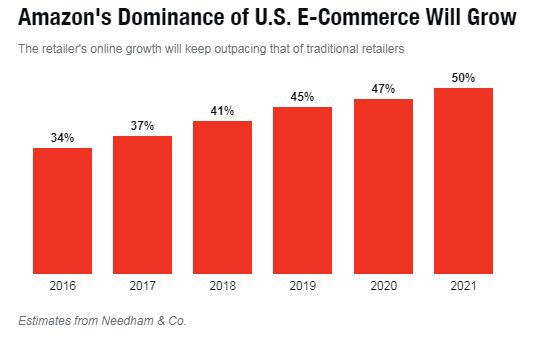
Via Fortune
Seattle has also been witness to years of skyrocketing housing costs due to the immense economic growth. The Seattle Times notes “the median price hit $730,000, up nearly 17 percent from a year ago” for houses. Amazon and the rest of the Seattle corporate community may not be the only players responsible for the unusually high prices, but it is an inescapable part of the equation.
In a recent interview, Columbia Business School professor Rita McGrath said that Amazon may be looking for a location with less staggering housing costs.
“It’s hard to attract people if they can’t afford the housing available locally,” she said.
The Amazon MBA Impact
Last year, we highlighted Amazon’s massive effect on the MBA job market. The company creates a direct pipeline from its MBA internship program to full-time employment, which should rapidly increase with the creation of HQ2. In a previous interview with the Financial Times, Miriam Park, the Amazon Director of University Programs, highlighted the company’s recruitment strategy:
“The Amazon recruitment process is designed to ensure we hire top candidates with high-growth potential whatever their background may be. As part of this we recruit current MBA students and MBA alumni for permanent and internship opportunities worldwide and see MBAs as an important part of our leadership development. We value people who can balance long-term strategic thinking with tactical execution, and who have the ability to make data-driven decisions.”
The internship programs open opportunities for MBAs to join the company as senior product managers, operations analysts, and more. Throughout the Request for Proposal form, Amazon frequently reiterates its desire to build in a location that has a strong academic culture, writing, “a highly educated labor pool is critical and a strong university system is required.”
Amazon will formally announce where it will build HQ2 next year.
